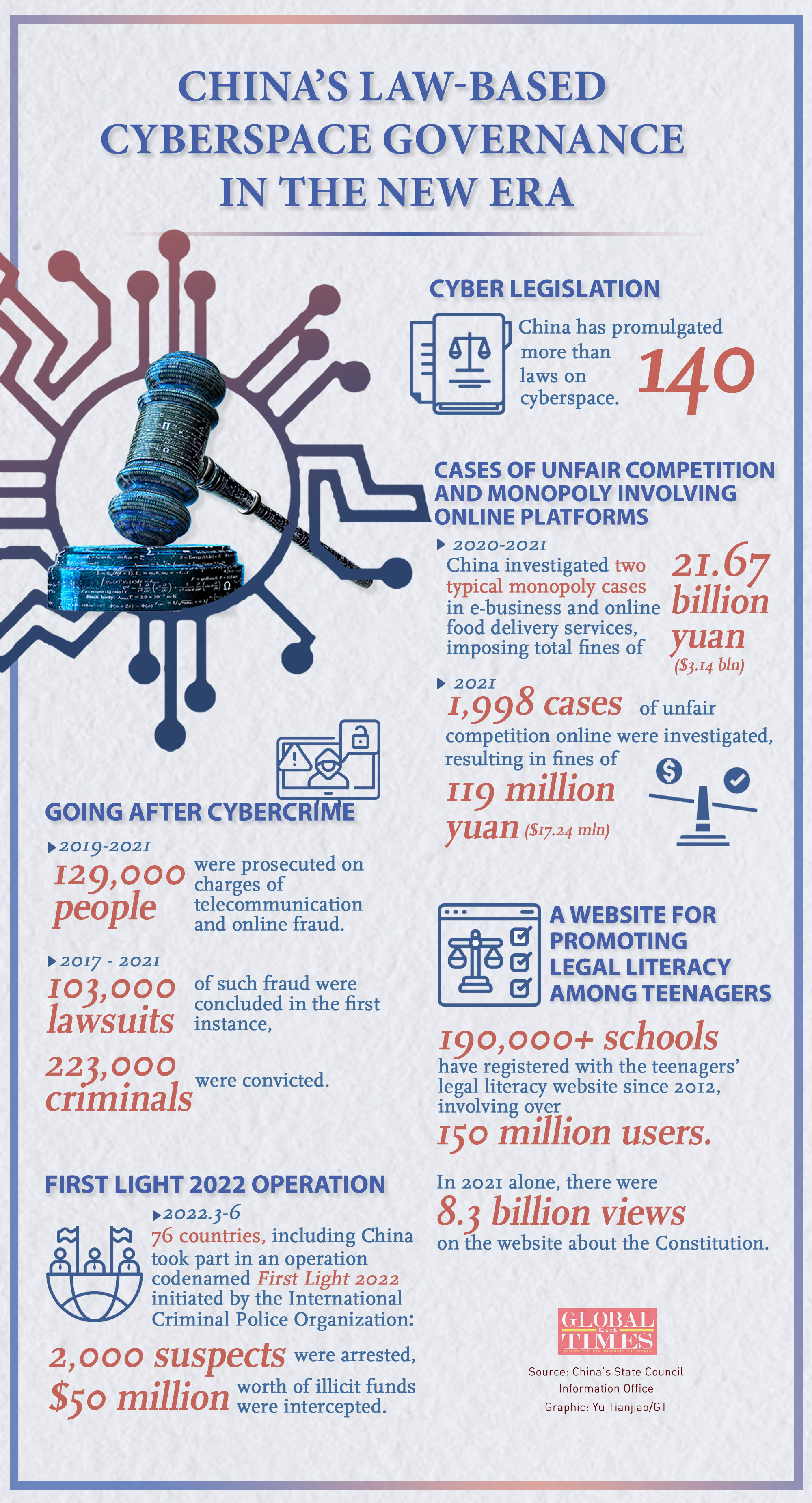
Cyber security Photo: IC
China on Thursday released a white paper on its cyberspace rule of law, elaborating on the "milestone" achievement of the country's law-based cyberspace governance in the past three decades, and how China's wisdom and solutions contributed to global cyberspace governance.
With a people-centered mindset, China has formed its own solution in comprehensive law-based cyberspace governance, with cyberspace being clearer, and the rights and interests of people being well protected, analysts said.
The white paper, titled "China's Law-Based Cyberspace Governance in the New Era," contains six chapters, including upholding the rule of law in cyberspace, consolidating the legal system, defending fairness and justice in cyberspace and increasing international exchanges and cooperation in the law-based cyberspace governance.
"The release of the white paper comes at a time when China's law-based cyberspace governance has achieved a milestone, where a comprehensive legal system in this field has been formed in the past three decades," Zhu Wei, vice director of the Communication Law Research Center at the China University of Political Science and Law, told the Global Times on Thursday.
Over the years, China has promulgated more than 140 laws on cyberspace, forming a cyber legislation framework with the Constitution as its foundation, supported by laws, administrative regulations, departmental rules, local regulations and local administrative rules, endorsed by traditional legislation, and underpinned by specialized cyber laws governing online content and management, cybersecurity, information technology and other elements, according to the white paper.
This system of laws on cyberspace governance provides a strong institutional guarantee for building up China's strength in cyberspace, the white paper read.
China ensured a national coordinated response in dealing with cyberspace governance, which combines the efforts of multiple departments, local governments, enterprises and netizens, Cao Shumin, deputy director of the Cyberspace Administration of China (CAC) said, when answering a question as to why China is able to make such achievements at Thursday's press briefing.

Graphic: Yu Tianjiao/GT
China's speed in developing the cyberspace rule of law benefited from the top-level planning mechanism, and over the years the country's cyberspace got clearer, said Xie Yongjiang, executive director of the internet management and legislation research center of the Beijing University of Posts and Telecommunication.
Law enforcement intensified over the years, covering illegal collection and use of personal information, as well as online infringement and piracy.
Law enforcement departments also carried out special campaigns to clean up illegal online information, which has improved the cyberspace ecosystem, the white paper said.
Through practical governance in the rule of law and years of exploration, China has extracted "Chinese wisdom and solution" in how to govern cyberspace and address emerging challenges. China now shares it through the white paper to the world, Zhu said.
In detail, China proposes the notion of building a community with a shared future in cyberspace, and hopes to jointly promote the rule of law in global cyberspace governance to make the fruits of digital civilization more beneficial to people of all countries, Zhu noted.
"The people-centered rule of law in cyberspace is especially worth mentioning in speaking of China's solutions in governing cyberspace. Our starting points of cyberspace governance are always based on protecting rights and interests of the people, especially vulnerable groups including minors and women," Zhu noted.
In some special vertical fields relating to cyberspace, China has advantages, such as the enacting of e-commerce laws and regulations related to social media platforms, Zhu noted. "I still remember when I participated in drafting laws with other experts such as the one relating to ride-hailing, we could hardly find similar references in other countries."
The white paper in particularly mentioned that more efforts will be placed in establishing regulations and mechanisms related to cyberviolence, and further beefing up the protection of victims.



